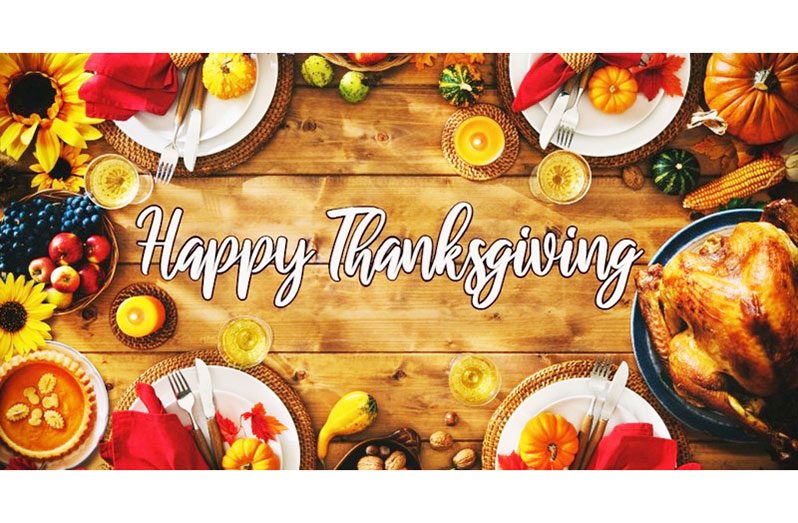By Vishnu Bisram
THURSDAY is Thanksgiving Day in America – an annual holiday that has been observed for centuries on the fourth Thursday of November. Thanksgiving Day is a historical celebration going back to the 1600s since the early settlement Europeans in North America – the Europeans gave thanks to the natives for the harvest and for helping them to grow food and build shelters.
It comes right after Diwali for Hindus in America, and is connected to the brilliant illumination and decoration of streets and homes. It is a national holiday, a kind of a spiritual celebration (without denomination), during which businesses and schools are closed for an extended weekend. The festival sets up a state of mind for the end-of-year celebrations — Christmas and Hanukah (Jewish) holidays which is a month later.
Thanksgiving gives thanks for the end of the harvest season in America. It started as a celebration and a festival of giving thanks as an expression of gratitude to the native indigenous people (called Indians by Europeans) for rescuing and assisting the European settlers from starvation. The Native Indians showed the Europeans how to grow and store food and stay warm in the winter. The festival has been observed as a tradition and has become an official holiday over the last several decades.
People generally celebrate the holiday with family reunions, church services, feasts, charitable offerings, and travel. And Guyanese and other Caribbean immigrants are deep in the celebration, giving their own flavour to it in terms of decorations, attire, cuisine, and drinks. Like the early European settlers and those who followed them well into the 1900s, latter immigrants like Guyanese, other Caribbean people, South Asians, etc… are giving thanks for their presence in America.
Immigrants like Guyanese are counting their blessings, giving thanks to America for welcoming them and for their enjoyment of a better quality of life than in their home countries.
America has been kind and receptive to immigrants enabling their rapid rise in income having their own homes, cars, businesses, post-secondary education, and high income jobs. Many even have multiple jobs and pursue higher education that was not available in Guyana.
Caribbean people are, for the most part, success stories with one of the highest income groups in the US contributing a lot more in taxes than in benefits received.
Many have become successful entrepreneurs in a very short time after arrival. And many have joined the ranks of professionals (in medicine, law, engineering, and computer technology) with some of the highest salaries in the nation.
Guyanese and ‘Trini’ immigrants give thanks by offering charities with the poorer sections of society – donating to organisations that help the less fortunate and preparing meals to feed the homeless.
Giving back to society is considered as part of their duty because the community has so much to be thankful for: being healthy and alive and escaping the impoverishment that once plagued Guyana.
Guyanese and Trinis in Queens annually shared food with the homeless and the less fortunate. Their assistance helps to ease social problems such as hunger, poverty and homelessness in the city.
As they do with all other festivals like Easter, Christmas, Eid, Holi, etc…, Guyanese Americans celebrate the Thanksgiving holiday in their own unique way with their traditional cuisine and drinks.
Every wave of immigrants, including recent arrivals like Guyanese (post-1965) and the large Caribbean and South Asian communities, who settled in the New York metropolitan region, have joined in the celebration by adding their own ethnic flavour of giving thanks and to the traditional cuisine, music, drinks and entertainment. Bollywood and Chutney are popular among Indo-Caribbeans while Calypso, Reggae and dub are popular among Afro-Caribbeans.
Caribbean people, as most Americans, view Thanksgiving as an occasion for family reunion and dinners. Relatives normally take turn hosting dinner or lunch over the four-day period from Thursday to Sunday. Dinner or lunch normally includes the traditional dishes supplemented with Guyanese cuisine and their favourite drinks.
Thanksgiving Day is usually celebrated with the largest parade in the nation on Fifth Avenue, featuring all kinds of magnificent floats and balloons of cartoon characters and a host of Hollywood celebrities and sports stars. Caribbean people patronise the parade or watch it on TV.
Guyanese are giving thanks for the progress they have made in America. They are contributing to making America a better place to live, and sharing their wealth and giving back to the society to which they owe their success. They are very thankful for their well-being in America.


.jpg)











